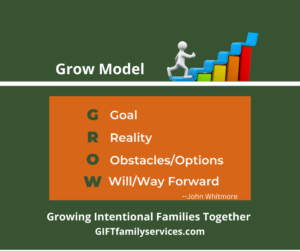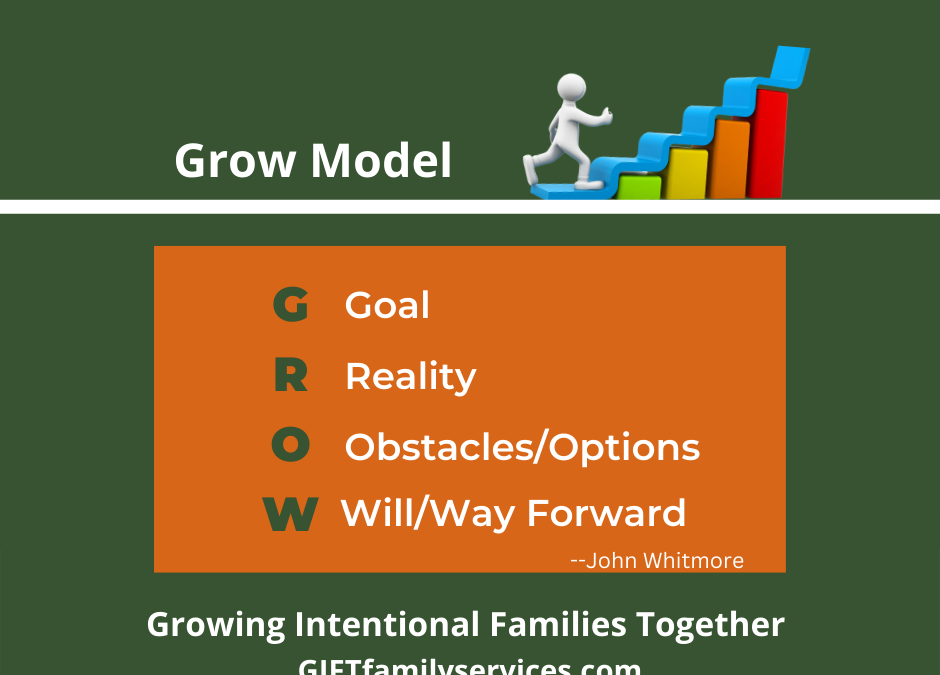 Since Growing is part of our company’s name, it will come as no surprise that we believe in a Growth Mindset when it comes to adoptive parenting Several years ago, we learned of the GROW Model of coaching that was developed in the 1980s by John Whitmore. He pioneered the executive coaching industry. GROW is his acronym in which the letters that stand for
Since Growing is part of our company’s name, it will come as no surprise that we believe in a Growth Mindset when it comes to adoptive parenting Several years ago, we learned of the GROW Model of coaching that was developed in the 1980s by John Whitmore. He pioneered the executive coaching industry. GROW is his acronym in which the letters that stand for
G = Goal; R = Reality. O = Obstacles or Options, W = Will or Way forward
We would like to add his Grow Model to your parenting toolbox. More specifically, we’d like you to use a Grow Model approach to your observance of National Adoption Awareness Month which runs for the month of November. We challenge you to GROW your perspective of adoption. We invite you to move beyond seeing adoption primarily as a “blessing” or “miracle.” Instead, embrace the more complicated reality that reflects adoption complexity. Help build a more nuanced conversation about adoption one that acknowledges the bitter and the sweet, the losses and the gains, the heartache and the joy.
Here are several GROW suggestions to which you might commit. Feel free to create some of your own.
Goal number one:
- Goal: Appreciate your children’s differences
- Reality: Their differences sometimes frustrate you
- Obstacle :You and your child are interested in totally different things
- Will: You will choose to accept, encourage, learn about, and support their interests
Goal number two:
- Goal: Remember to validate your children’s adoption-connected losses
- Reality:: You like to focus on how happy adopting them made you
- Obstacle: You fear talking about their losses will worsen their losses & create distance between you.
- Will: You will be a compassionate witness to their grief & loss
Goal number three:
- Goal: Honor your child’s need for continuity with their lineage and culture
- Reality: Talking about or spending time with first parents makes you sad and feel like an outsider
- Obstacle :You worry they’ll feel more connected to their birth parents than to you
- Will: Support their need to connect. Work through your own fears.
Goal number four:
- Goal: Deepen your appreciation for your child’s journey
- Reality It’s easier to think of adoption as a completed event firmly in the past
- Obstacle You want things to be resolved, not to keep creating difficulty and challenge
- Will You will remind yourself that adoption issues are never totally resolved. They spiral throughout their lifetime and yours
Growth Mindset
We offer you a final goal: help your children develop a Growth Mindset. This is a belief system that values effort, persistence, and learning–learning from failure specifically– instead of relying on being smart. Kids who are repeatedly told they are smart often develop a false notion that school–or life– should be easy for them and that success should come quickly and without struggle. Then, when work or school, or life requires significant effort, practice, persistence, and studying, these kids falter or give up. They fear failure. It contradicts their self-image as being smart.
Growth Mindset kids, on the other hand, tend to learn from failure instead of fearing it. They see failure as part of the process. They understand that success is produced through hard work. These kids recognize that struggle is a fundamental part of the process. Kids with a Growth Mindset prioritize their ability to THINK over their ability to memorize facts. Growth Mindset kids view failure as the rungs of the ladder lifting them toward success. Cultivating a Growth Mindset helps to increase their resiliency which is an especially important life skill for adoptees.
Parenting with a Growth Mindset
Of course, it is important for us as parents to embrace a Growth Mindset in our own approach to living and intentionally model it for our kids. By allowing kids to see that we encounter struggle, cope with it, and “survive,” we provide both an important model and a healthy dose of reality. (It goes without saying, that this must be done with age-appropriateness in mind and to also not burden children with worries that must sit firmly on adult shoulders and minds.) During family conversations talk about how you face challenges at work and in your personal life. Discuss how sometimes you succeed and sometimes you fall short. Using a Grow Model, describe how it feels when your boss requires yet another revision or kills a pet project you’ve been developing. Let your kids see how you respond to failure and challenges in your own life.
When kids never see or hear about this part of our lives, they develop a false notion that being an adult means we succeed at everything we do and accomplish it on the first attempt and without effort. At first, this suggestion to share your ups and downs might seem silly or embarrassing. On the other hand, without any evidence to the contrary, children will definitely infer that success is a cakewalk for us. Of course, as I mentioned earlier in this blog, it is vital not to burden kids with adult pressures so be mindful of what you are sharing. Make clear that our challenges are our opportunity to learn and grow and that we do not expect them to take on our stuff.
As Intentional, Adoption Attuned parents our goal is to raise healthy, happy, resilient, productive kids with a realistic understanding of the link between effort, persistence, and success. We want them to be able to think for themselves instead of blindly following their peers. We hope they learn to believe in themselves and use that belief to help them grow a life of meaning and contribution.
As part of the larger adoption community, let’s commit to GROWing our support for adult adoptees and first families. Also, remember the purpose of National Adoption Awareness Month is to help find families for foster children whose parental rights have been terminated. Please resist the temptation to use NAAM as an opportunity to celebrate your personal adoption experience or to crow about how wonderful adoption has been for you. Instead, amplify NAAM’s purpose to promote the effort to help these kids find families.
__________________________
- Call us at 1-800-653-9445
- Listen to our podcasts: Adoption Matters: Real People. Real Life. Real Talk and Essentials of Adoption Attuned Parenting
- Watch our YouTube channel
- Read Books written by our coaches
- Click to learn more about Adoption Attuned Certified coaching!



